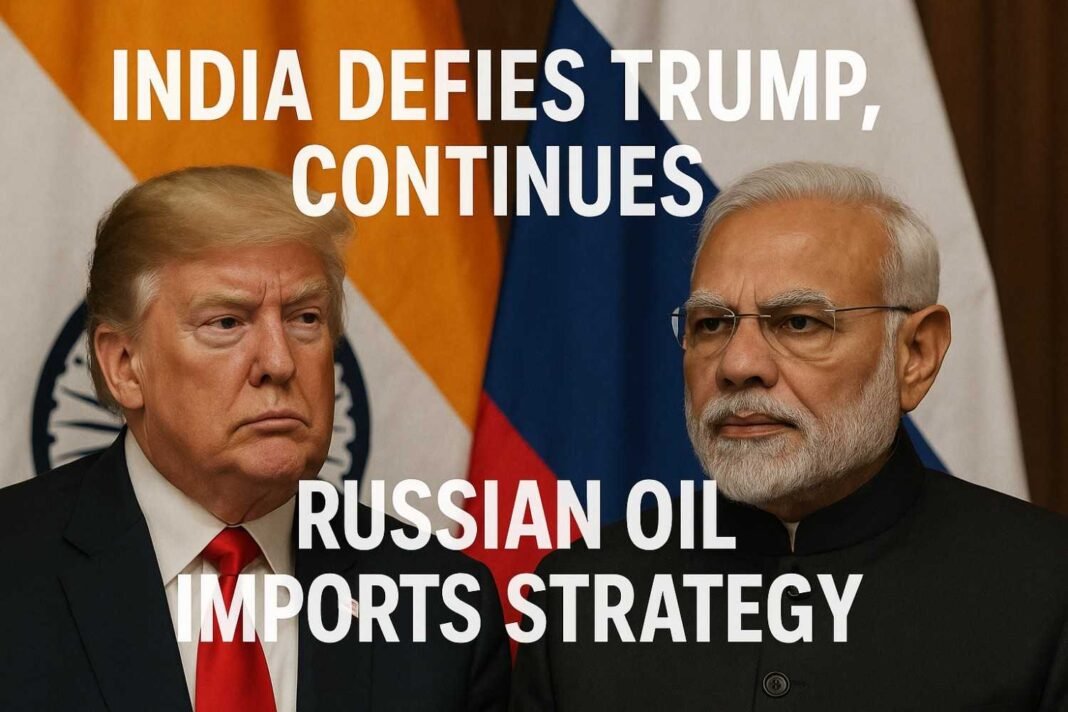India Maintains Russian Oil Imports Despite Trump’s Claims
– India has rejected recent claims made by U.S. President Donald Trump regarding a halt in Russian oil imports, with senior Indian officials confirming that no directive has been issued to oil companies to cut back on crude purchases from Moscow. This response comes amid rising geopolitical tensions and Washington’s growing criticism of India’s energy and defense ties with Russia.
Speaking to reporters on Friday, President Trump claimed he had heard that India had ceased buying oil from Russia, adding, “That’s what I heard. I don’t know if that’s right or not, but that’s a good step. We’ll see what happens.” The remark follows a week in which Trump sharply criticized India for its continued economic and military engagement with Russia, threatening trade penalties over its Russian oil purchases.
However, multiple Indian government sources have clarified that there is no change in New Delhi’s policy regarding Russian oil. “The government has not given any direction to oil companies to stop buying Russian crude,” one senior official told Reuters on Saturday, requesting anonymity. Another added that India would continue sourcing energy based on market conditions, long-term contracts, and its national interests.
Long-Term Contracts and Economic Rationale
Russia has emerged as India’s largest crude oil supplier since Western sanctions on Moscow caused global oil price distortions. The discounted rates offered by Russia have been particularly attractive to India, the world’s third-largest oil importer and consumer. Between January and June 2025, India imported approximately 1.75 million barrels per day (bpd) of Russian crude—an increase of 1% over the same period last year.
“These are long-term oil contracts. It is not so simple to just stop buying overnight,” a second government source said, emphasizing the complexity and strategic nature of India’s energy procurement. The official also noted that Indian imports have played a stabilizing role in global oil markets, preventing a sharper rise in prices amid ongoing geopolitical uncertainty.
India’s Ministry of External Affairs (MEA) also addressed the matter during its weekly briefing on Friday. MEA spokesperson Randhir Jaiswal reaffirmed that India’s energy sourcing decisions are based on global market dynamics and national interests. “We take decisions based on the price at which oil is available in the international market and depending on the global situation at that time,” Jaiswal said.
U.S. Pressure Mounts, But India Stands Firm
President Trump’s remarks were made in the broader context of increasing trade pressure on New Delhi. Earlier in the week, he signed an executive order imposing a 25% tariff on Indian exports as part of a sweeping measure targeting around 70 nations. Notably, the final order did not include the additional penalties he had previously hinted at regarding India’s Russian oil imports—though analysts suggest such measures could still be on the table.
Trump also accused India of maintaining some of the “most strenuous and obnoxious non-monetary trade barriers” globally and lamented the U.S. trade deficit with India. “India is our friend, but we have, over the years, done relatively little business with them because their tariffs are far too high,” he said, adding that India’s historical defense partnerships with Russia further complicate matters.
Refiners Pause Russian Crude Orders Amid Market Shifts
While Indian officials confirmed that oil trade with Russia continues, sources also indicated a recent dip in actual purchases. Four individuals familiar with the matter told Reuters that major state-run refiners—including Indian Oil Corporation, Bharat Petroleum, Hindustan Petroleum, and Mangalore Refinery—had not sought Russian cargoes in the past week.
This pause, however, appears to be temporary and market-driven. Discounts on Russian crude have narrowed significantly since July, making it less economically attractive for Indian refiners. Lower export volumes from Russia and steady global demand have contributed to this price shift.
Nonetheless, officials insisted that the overall strategy remains unchanged. They highlighted that unlike Iranian or Venezuelan crude, Russian oil is not directly sanctioned, and India continues to purchase it under the price cap agreed upon by the European Union.
In conclusion, despite external pressure and recent commentary from Washington, India has reaffirmed its commitment to safeguarding its energy security and economic interests through continued engagement with Russia. Any future changes in oil sourcing, officials say, will be dictated by market economics—not political rhetoric.








